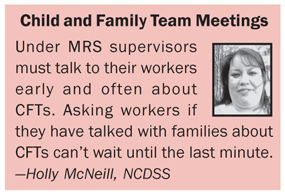 |
 |
 |
©
2008 Jordan Institute
for Families

Vol.
13, No. 2
March 2008
MRS: The Impact of System Reform on Supervisors
We have already recognized supervisors for their contribution to the success of the Multiple Response System (MRS), North Carolina’s child welfare system reform effort. Yet supervisors have also been profoundly affected by the progress they have helped bring about.
To explore MRS’s impact on supervision Practice Notes interviewed county DSS supervisors, as well as Holly McNeill and Patrick Betancourt, who have been meeting monthly with supervisors for the past several years to talk about MRS. Here’s what they told us.
How MRS Has Changed Supervision
Emphasis on Coaching, Listening to Workers. Under MRS supervisors use coaching more often. This is a shift away from traditional supervision, where a lot of the attention was focused on administrative quality control and ensuring policy was followed to the letter. With MRS supervisors must pay more attention to the growth of family-centered practice. Different supervisory skills are needed for that, and coaching is one of them.
Listening to workers is another. One supervisor told us, “Supervisors always had to listen, but it is more important now than ever to spend time listening to workers and helping them problem solve and encouraging them to talk to families about child and family team meetings, frontload services, and make sure we aren’t being punitive.”

More Individualization. In a parallel to the individual-ized attention we ask workers to give families, MRS requires supervisors to be more sensitive to the workloads and needs of each worker. Some supervisors are moving away from assigning cases strictly on a rotating or numerical basis. Instead they factor in the complexities of each person’s workload, assigning families to the worker best able to assist them.
More supervisors are saying to staff: “My job is to help you do your best work. That is not a one-size-fits-all proposition.” For this to work supervisors must build trust. When trust is there, workers are less likely to be upset by differential treatment of their peers—they understand supervisors do what they do to ensure workers and families get what they need to succeed.
Supporting Workers. Many supervisors say their staff agree with MRS’s family-centered principles, but some have trouble applying them. As one supervisor put it, “Workers are moving toward sharing power, but they were so used to having the answers. Workers will still sometimes say to me, ‘What are we going to do about this family?’ I try to help by asking, ‘Have you asked the family this question?’ But it can be scary to workers to give up that authority.”
Empowering Workers, Building Expertise. MRS is an opportunity for agencies to step back and not be the boss or the expert when working with families. This applies to supervisor-worker relationships, too. One person told us, “As a supervisor I don’t have to have all the answers. I can turn to my workers and ask them what they think the solution to a situation might be.”